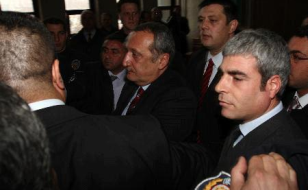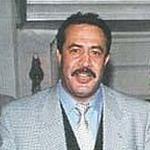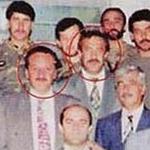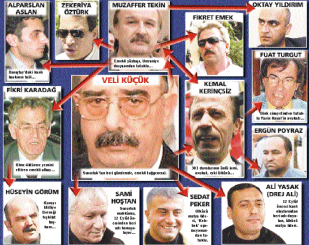Mehmet Ağar, former Chief of Police, and then Minister of the Interior, is now facing a trial because his parliamentary immunity was lifted after his resignation from the True Path Party (DYP) leadership after the general elections of July 2007.
"Deep state" relations
 The trial concerns the events remembered in Turkey as the “Susurluk scandal”. A car accident in which three people died in 1996 revealed relations between the police, a parliamentarian from Urfa, the southeast of Turkey, and a contract killer. These “deep state” relations were investigated in a satisfactory manner, leading many to claim that the current clandestine Ergenekon organisation was able to grow out of Susurluk.
The trial concerns the events remembered in Turkey as the “Susurluk scandal”. A car accident in which three people died in 1996 revealed relations between the police, a parliamentarian from Urfa, the southeast of Turkey, and a contract killer. These “deep state” relations were investigated in a satisfactory manner, leading many to claim that the current clandestine Ergenekon organisation was able to grow out of Susurluk.
Ağar rejects accusations and will not attend hearings
Mehmet Ağar is accused of forming an armed illegal organisation in the Susurluk context. He is demanding acquittal.
He attended the hearing in the Ankara 11th Heavy Penal Court yesterday (9 February); he said that when he was Chief of Police, he had thousands of armed people under his command and would not have felt the need to form an armed group.
In addition, his lawyers said that it would be difficult for Ağar, who lives in Istanbul, to attend further hearings in Ankara; they applied for permission to hand in the defence in writing, and the court consented.
The defence also asked for more time to prepare, since the evidence fills 26 binders; the trial was adjourned until 13 May.
Third parties not admitted
Lawyer Özlem Gümüştaş told bianet that the court rejected three applications of intervening parties. One of them was her client Hüseyin Ocak, brother of Hasan Ocak who disappeared in 1995, when Ağar was Chief of Police. He disappeared after protests in the Gazi neighbourhood of Istanbul, where the police opened fire and killed 17 people. His body was found in a graveyard for the poor in Istanbul 58 days later, and it bore traces of torture.
Other parties wishing to join the trial were the Association of Contemporary Lawyers (ÇHD), who claim that Ağar made unjust accusations about them, and relatives of İbrahim İlçi, who was killed in operations against the militant leftist Dev-Sol organisation.
The court argued that the evidence admitted in court did not prove that any of the applicants suffered injury from crime and rejected the applications. The lawyers will follow the case and renew the applications at a later stage.
"I knew Çatlı from the press"
Mehmet Ağar stated in court that he only knew Abdullah Çatlı, the contract killer who died in the car accident in Susurluk, from the press and was not further acquainted with him.
Ağar stands accused of hiding Abdullah Çatlı when he was accused of murders and not informing authorities, of handing Abdullah Çatlı and Yaşar Öz gun licences and special passports, thus abusing his position.
At the hearing, Ağar claimed that the passports, and thus also his signature on them, were fake. He denied any involvement in gun licences and pointed out that the police had carried out an investigation in the matter.
He told the court that he knew Öz through a secret service member, Tarık Ümit. He said that the PKK was earning money through human trafficking, and that he wanted to use Öz’s connections and received some telephone numbers from him.
Ağar was then asked about the fate of Tarık Ümit, who disappeared in 1995. Ağar said that another secret service agent told him that there were rumours that the police had been involved. When Ağar asked the Istanbul police, he said, he found no evidence, and the secret service agent never called him again.
Bucak tribe convinced to become village guards
Ağar was further questioned on all his relations with suspects in the Susurluk trial. Ağar claimed that while the PKK was pressing the Bucak tribe, of which MP Sedat Bucak was a member, to remain neutral, Ağar was convincing them to become village guards, fighting against the PKK with the army.
Sedat Bucak was the only person to survive the Susurluk car crash.
Because, so Ağar, the Urfa region where the tribe lived was not under emergency law, there were security fears. “We helped the tribe to become village guards.”
Ağar also claimed that he was helping Hüseyin Kocadağ, a special police team chief in Diyarbakır and Hakkari, both in the southeast of Turkey, at the time. Kocadağ was also found dead in the Susurluk car crash.
As for special police forces officer Ayhan Çarkın, who claimed that he killed 1,000 people in operations, Ağar said that he knew him from motivational seminars for police officers held in Istanbul.
Ağar said he met İbrahim Şahin, the former head of special forces who is now a defendent in the Ergenekon trial, during the formation of the special forces unit. (TK/AG)



















